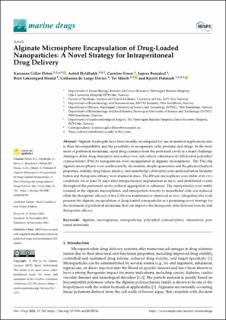Alginate Microsphere Encapsulation of Drug-Loaded Nanoparticles: A Novel Strategy for Intraperitoneal Drug Delivery
Fleten, Karianne Giller; Hyldbakk, Astrid; Einen, Caroline; Benjakul, Sopisa; Strand, Berit Løkensgard; Davies, Catharina de Lange; Mørch, Ýrr Asbjørg; Flatmark, Kjersti
Peer reviewed, Journal article
Published version
Permanent lenke
https://hdl.handle.net/11250/3044469Utgivelsesdato
2022Metadata
Vis full innførselSamlinger
- Institutt for bioteknologi og matvitenskap [1574]
- Institutt for fysikk [2695]
- Publikasjoner fra CRIStin - NTNU [38127]
Sammendrag
Alginate hydrogels have been broadly investigated for use in medical applications due to their biocompatibility and the possibility to encapsulate cells, proteins, and drugs. In the treatment of peritoneal metastasis, rapid drug clearance from the peritoneal cavity is a major challenge. Aiming to delay drug absorption and reduce toxic side effects, cabazitaxel (CAB)-loaded poly(alkyl cyanoacrylate) (PACA) nanoparticles were encapsulated in alginate microspheres. The PACAlg alginate microspheres were synthesized by electrostatic droplet generation and the physicochemical properties, stability, drug release kinetics, and mesothelial cytotoxicity were analyzed before biodistribution and therapeutic efficacy were studied in mice. The 450 µm microspheres were stable at in vivo conditions for at least 21 days after intraperitoneal implantation in mice, and distributed evenly throughout the peritoneal cavity without aggregation or adhesion. The nanoparticles were stably retained in the alginate microspheres, and nanoparticle toxicity to mesothelial cells was reduced, while the therapeutic efficacy of free CAB was maintained or improved in vivo. Altogether, this work presents the alginate encapsulation of drug-loaded nanoparticles as a promising novel strategy for the treatment of peritoneal metastasis that can improve the therapeutic ratio between toxicity and therapeutic efficacy.

